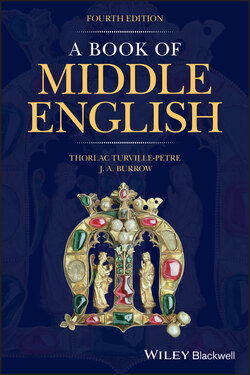Читать книгу A Book of Middle English - J. A. Burrow - Страница 76
5.6.8 Impersonal Verbs
ОглавлениеSome verbs which have a personal subject in Modern English, such as ‘I like’, are impersonal in Middle English, with it as subject and me etc. as dative object: it likes me. Quite regularly the dative object precedes the verb and the subject it is not expressed: me lykes / þat I schal fange, ‘it is pleasing to me/I’m glad that I shall receive’, 9/390–1. Another common impersonal verb with the same meaning is list; such constructions may need to be paraphrased rather than translated word for word: me luste bet speten, ‘it pleases me better to spit’, so ‘I’d rather spit’, 2/39; ne lust him nu to none unrede; / Nu him ne lust na more pleie, ‘nor is he attracted now to any evil counsel, nor does he like fooling around any more’, 2/212–13. Hunger, ‘be hungry’, fall, ‘happen’, need, ‘be necessary’, and reche, ‘care’, are some other common verbs that may be used impersonally: ow (dative) schal eaver hungrin, ‘you’ll always go hungry’, 4/64–5; hym neded no gyde, ‘no guide was necessary to him’, 18a/166; me no reche, ‘I don’t care’, 5/342.
The verb think is derived from two Old English verbs, þencan, ‘to think’, and þyncan, ‘to seem’. The two are still distinguished as þenk and þynk in the Gawain manuscript: þenk wel, Sir Gawan, 9/487; what maystery þe þynkez, ‘what accomplishment does it seem to you’, 8/482. In the line þenne byþenk þe, mon, if þe forþynk sore, 8/495, the first verb (OE biþencan) means ‘consider’ and has a reflexive pronoun þe; the second has an impersonal construction (and is subjunctive after if), ‘if it upsets you’. In me thynkes /Hom burde, ‘it seems to me they ought to’, 11/259–60, there are two impersonal verbs together.
Some adjectives governing the dative have similar impersonal constructions: lever me were, ‘I should rather’, 5/177; me is þe wurs, ‘it is the worse for me’, 2/34; þe is bettere, 14j/23; wel is me, 14q/17; hou wo þe beet, ‘how great is your grief ’, 14p/18.
